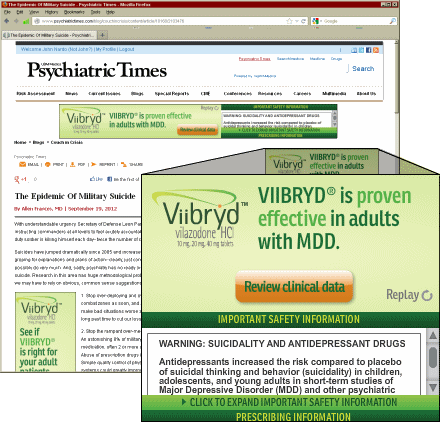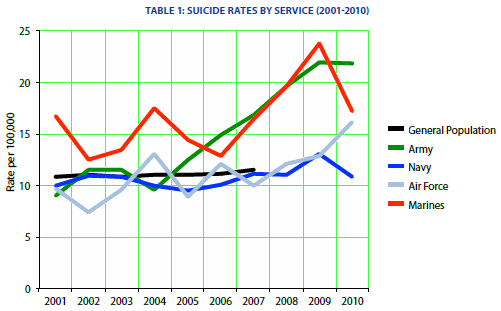Pardon my irony, but having this ad plastered with its warning all over the page with Dr. Frances’ article was just too tempting to ignore:

With understandable urgency, Secretary of Defense Leon Panetta has made suicide one of his top priorities, instructing commanders at all levels to feel acutely accountable for it. The numbers are startling. On average 1 active duty soldier is killing himself each day–twice the number of combat deaths and twice the civilian rate. Suicides have jumped dramatically since 2005 and increased by 18% in just the last year. The DOD and VA are groping for explanations and plans of action–clearly, just commanding the commanders to prevent suicide can’t possibly do very much. And, sadly, psychiatry has no ready or certain answers, no sure way to predict or prevent suicide. Research in this area has huge methodological problems and is unlikely to bear any low hanging fruit. So, we may have to rely on obvious, common sense suggestions:
The suicide problem is just the very tip of a much larger iceberg. That 1 active duty soldier per day is desperate enough to kill himself speaks volumes of the less obvious, but significant, distress experienced by many other soldiers and veterans. We have a responsibility to stop over-extending ourselves in poorly chosen "wars of choice" and to pick up the pieces of the harms already done.

It’s not new. After three frivolous wars in a row, it seems like we’d learn – but we didn’t. That’s the biggest point of all. The only way we could’ve stayed in these last two wars so long was the all voluntary military. We need to send our war-makers sons [and daughters] off to fight to keep us from doing this. Draft Mitt’s sons and Obama’s daughters. Which gets me to Frances number 1: over-deploying. That was a predictable mistake, actively made. So was over-medication. Keeping people in combat with medication? The suicide rate was as predictable as the sun rising in the morning:
I knew a simple soldier boy…..
Who grinned at life in empty joy,
Slept soundly through the lonesome dark,
And whistled early with the lark.
In winter trenches, cowed and glum,
With crumps and lice and lack of rum,
He put a bullet through his brain.
And no one spoke of him again.
You smug-faced crowds with kindling eye
Who cheer when soldier lads march by,
Sneak home and pray you’ll never know
The hell where youth and laughter go.
Who grinned at life in empty joy,
Slept soundly through the lonesome dark,
And whistled early with the lark.
In winter trenches, cowed and glum,
With crumps and lice and lack of rum,
He put a bullet through his brain.
And no one spoke of him again.
You smug-faced crowds with kindling eye
Who cheer when soldier lads march by,
Sneak home and pray you’ll never know
The hell where youth and laughter go.
Suicide in the Trenches
Siegfried Sassoon 1918
Siegfried Sassoon 1918
Given the circumstances, I think our military has done a good job dealing with an absurd situation. As a country, we’ve forgotten about how irresponsibly our leaders acted in those years. We’ve forgotten Gitmo, and waterboarding, and Plamegate, and Rumsfeld, and Abu Ghraib, and Cheney, and Blackwater. Frankly, the military was actually the best thing going during those years. The problems were at home, and we sacrificed a lot in the process. I agree with all of Dr. Frances’ comments, but I’d just add reinstitute the Draft. These wars should have never happened, and certainly never gone on so long. The fact that they did has a lot to do with the low morale and the disillusionment in our current world. We betrayed our kids and our future…
Wars of 10 years have nothing positive or reassuring to say about. Also, I am sick of hearing casualty numbers when technology is saving lives, yet for what? Morbidity is worse now than mortality of combat. This is the legacy of Bush/Cheney. Sending a hundred thousand soldiers indefinitely into a combat situation that is unwinnable, then being able to dump it on the next President, and said successor just sits there dwindling his thumbs. An indictment of politics in general today.
There are worse things than death, eh?
I would like to see some of those hired vets work on a system to make soldiers into veterans eligible for benefits as soon as they’re debriefed.
There also should be a review of all the soldiers given diagnoses such as “personality disorder and discharged after years of service.
Records of all soldiers given psychoactive drugs while deployed in Iraq and Afghanistan need to be gathered and studied.
BOM: You forgot to mention those Black Hawk helicopters dropping tons of Seroquel on our unsuspecting, volunteer army.